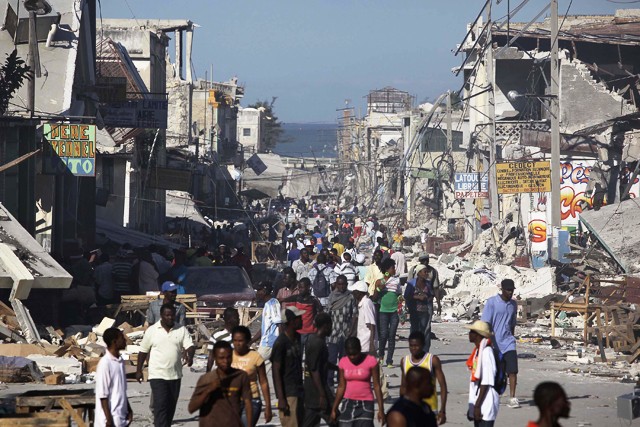In the days following the earthquake in Haiti, Barbara Pierre-Louis called her relatives across North America asking again and again, âÄúHave you heard anything?âÄù Phone and power lines were down near HaitiâÄôs capital city, Port-au-Prince, where the University of Minnesota graduate student grew up and where much of her family lives. The suspense, she said, was the most difficult thing to handle. When she finally got a call from her family in Haiti, the phone connection was bad. She listened as they repeated, âÄúHello, hello?âÄù They could not hear her answer, but she was glad just to listen to their voices. Most of Pierre-LouisâÄô family was safe, but her uncles âÄî professors from Michigan and Montreal who had returned to Haiti before the quake âÄî were killed. Her uncles are two of what the Red Cross estimates to be 45,000 to 50,000 dead in Haiti following the magnitude-7 earthquake that hit a week ago. Haitian President René Préval said the number of deceased could be more than 100,000. In the past week, Haiti has seen a surge of humanitarian aid from across the world, including money, food, water, emergency rescue and military teams. Many Americans wanted to go to Haiti to help, but the United States is only sending expert rescue workers. Cheryl Robertson, a nurse and professor at the University, applied to help in Haiti through the American Refugee Committee but was turned down because she was trained in refugee aid, not disaster aid. Jill DeBoer, director of the UniversityâÄôs Office of Emergency Response and a member of the national Medical Reserve Corps, said she volunteered the University-based Medical Corps team to help, but she said, âÄúit was not our turn.âÄù She said the coordinated effort was probably taking aid groups from the South who are closer to Haiti. Daniel Jean Mary came from Haiti to Minnesota to study at Inver Hills Community College. Jean Mary grew up in an orphanage in Haiti and first visited the United States as a member of a drum group. He chose to come to the United States for a better education. Jean Mary plans to return to Haiti after he receives a degree. ItâÄôs necessary for educated people to return and help the country, he said. Jean Mary said itâÄôs great that so many people want to help Haiti, but the United States and United Nations should change how they are sending aid. He said cramming supplies into Port-au-Prince is not the best way to help, and aid needs to be sent to other ports around the island. University graduate student Ruben Joanem said supplies should be brought to the big port in Cap-Haïtien, where he grew up. Cap-Haïtien is on the northern edge of the island, about 80 miles from Port-au-Prince. Getting aid across the island could take about 10 hours, said University chemistry and chemical engineering junior Eric OâÄôHara, who worked in Cap-Haïtien in May 2009 through Engineers Without Borders. Highways are littered with potholes that could swallow a small car. âÄúNo one is going over 40 unless they have a death wish,âÄù he said. But Port-au-Prince needs to be evacuated as soon as possible, and people should be given specific locations to move to, Joanem said. The capital is a âÄúbig stinking graveyardâÄù where bodies are decaying in the streets and people are without food, Joanem said. People who lost their homes are sleeping on the streets, said Rudy Perrault, a music professor at University of Minnesota-Duluth who grew up on the outskirts of Port-au-Prince. They are sleeping under âÄúbeautiful skiesâÄù and the temperature is 65 to 70 degrees, but that will change with the seasons, Perrault said. HaitiâÄôs rainy season begins at the end of March. Before the Haitians move they must mourn and bury the dead, he said. âÄúHaitians like to have our ceremonies and bury our dead âĦ Mass graves wonâÄôt be able to really bring closure.âÄù Despite the need to grieve, Jean Mary said Haiti must seize this moment when the United States and world is focusing on the country to rebuild the infrastructure. Haiti became independent after revolting against French colonization in 1804. It has had a long history of political corruption and instability, and HaitiâÄôs attempts to fix its infrastructure have been plagued by mudslides and hurricanes. Recovering from the earthquake and rebuilding the infrastructure will be a long process, Joanem said. Haiti must overcome the label of being âÄúculturally inferior,âÄù he said. Pierre-Louis recalled a similar stigma when she moved from Haiti to Miami at age 7. People looked down upon her and said, âÄúDumb Haitian, go back home,âÄù she said. âÄúIf only they knew how smart we were, how strong we are,âÄù she said. Pierre-Louis wants to return to Haiti and show her two daughters, ages 3 and 6, her homeland. But she said she is afraid to bring young children to an unstable area without a good hospital. When Pierre-Louis heard about the earthquake, she asked, âÄúHow much more can this place take?âÄù Haiti used to be called the Pearl of the Antillies by the French. âÄúLike a treasure,âÄù Pierre-Louis said quietly, staring down at her hands folded in her lap. âÄúIt was a coveted place.âÄù âÄîMacKenzie Collins contributed to this article.

Image by JULIE JACOBSON, AP PHOTO
Earthquake survivors walk amidst collapsed buildings and rubble in downtown Port-Au-Prince, Thursday, Jan. 14.
Haiti disaster hits home
Haitian students and experts discuss how to help the disaster-stricken nation.
Published January 17, 2010
0
More to Discover







